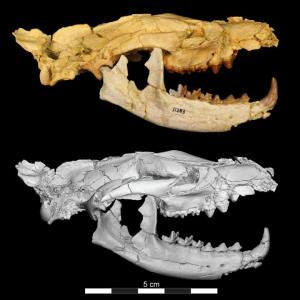
A Hyaenodont skull. (Image by Matthew Borths)
A 34-million-year-old Egyptian fossil has identified a new member of the ancient carnivore species, hyaenodonts. Researchers gave the new species the name Masrasector nananubis, referring to Anubis, the dog-headed Egyptian god of mummification and afterlife. Masrasector nananubis were likely fast-moving, terrestrial meat-eaters about the size of a modern skunk. This is a significant discovery to help find out more about the lifestyles of ancient hyaenodonts, and figure out why they became extinct when the modern-day dogs, cats and hyenas moved into Africa.
Authors:
Matthew R. Borths, Erik R. Seiffert
Corresponding author:
Matthew Borths, Ohio University, Email: borths.1@gmail.com
Original paper published in PLOS One on April 19, 2017.


